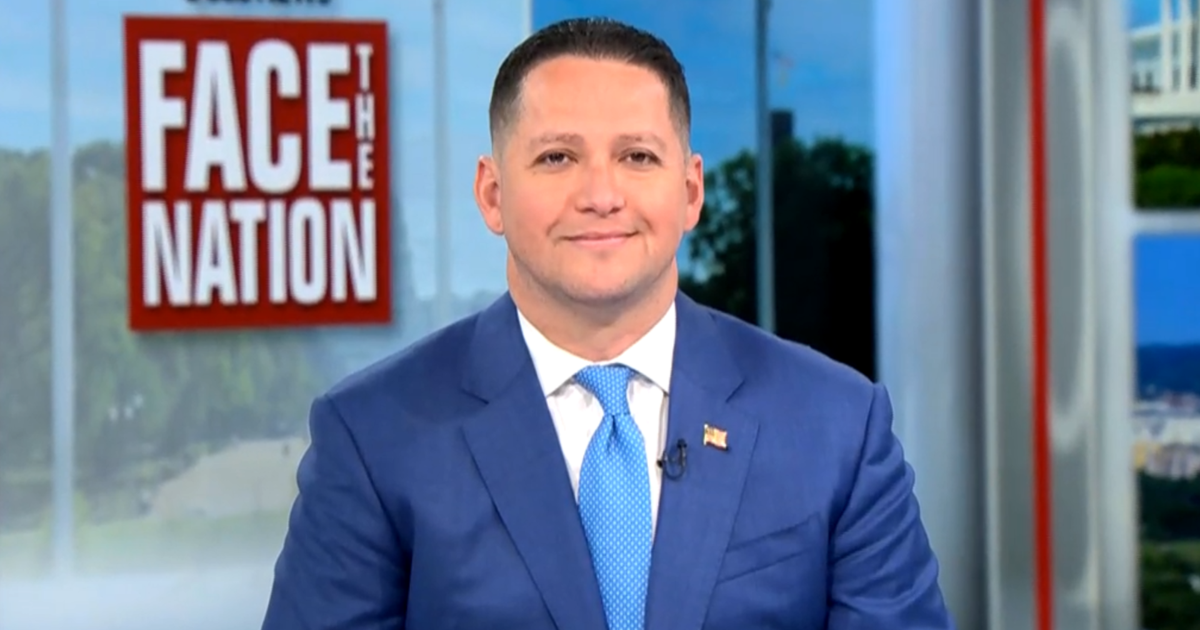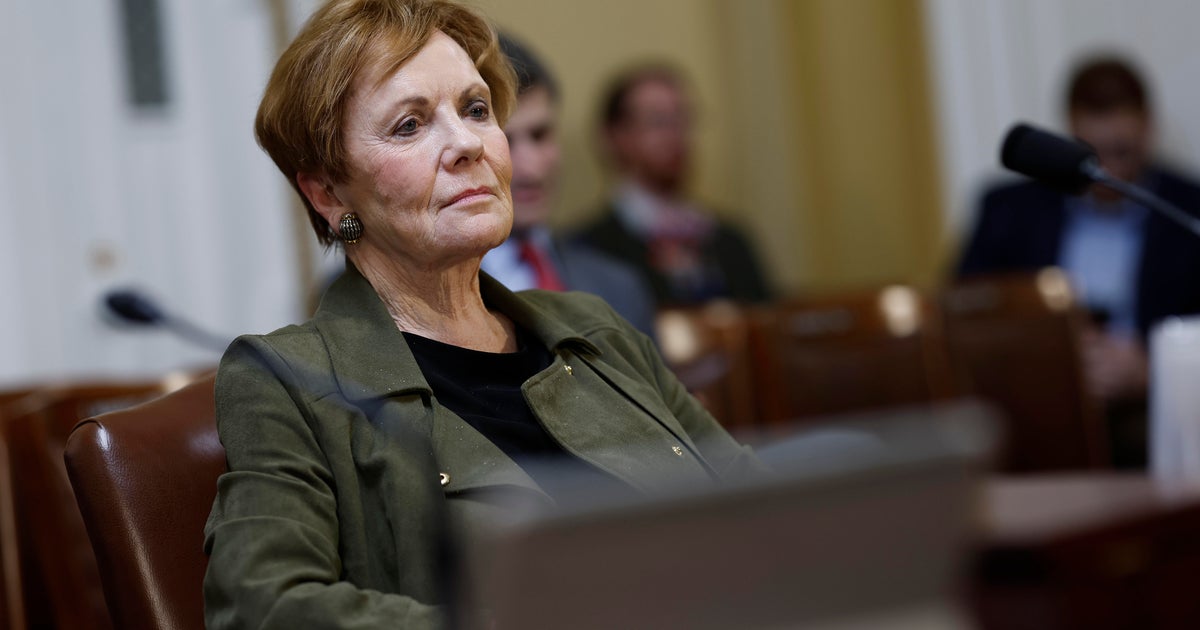CBS News
Transcript: Rep. Tony Gonzales on “Face the Nation with Margaret Brennan,” Dec. 22, 2024

The following is a transcript of an interview with Rep. Tony Gonzales, Republican of Texas, on “Face the Nation with Margaret Brennan” that aired on Dec. 22, 2024.
MARGARET BRENNAN: Good morning and welcome to Face the Nation. We are just three days away from Christmas and the start of Hanukkah. Congress has gone home, but is last week’s chaos on Capitol Hill an omen of what is ahead in 2025? Texas Republican Congressman Tony Gonzales is here in studio to answer that. Good morning to you.
REP. TONY GONZALES: Good morning, Margaret, thanks for having me.
MARGARET BRENNAN: So we just saw turmoil within the party over the past few days after President elect Trump and Elon Musk scuttled this bipartisan deal, then demanded another deal that couldn’t get enough Republican support to get over the finish line. Then we have this emergency stopgap measure that only takes us through mid March. You were one of 34 Republicans to vote against it. Why?
REP. GONZALES: It’s pretty simple, my- my constituents were against the CR just as much as I was against the CR. This- it’s been a tough week, though. It started with a tragic shooting in Madison, Wisconsin. I’ve worked in a very bipartisan manner to make sure we have a national strategy that prevents against some of the school shootings that are occurring. I’ve been working with others to get that done. I think that’s important. And then in the house, of course, we have this messy bill that was put on the floor. It started with a 1500 page bill. In my eyes, there’s no doubt that there’s a sickness in DC, and that sickness isn’t going to be cured with these big, long, pork-filled bills. You do got to give President Trump a lot of credit, though he was able to whittle that down to 116 pages. Once again, the reason I voted no is I think CRs are terrible. They do nothing but kick the can down the road. Let’s fast forward to March. Do you think we’re going to be any closer to coming up with a spending deal then than we are now? I don’t think so.
MARGARET BRENNAN: But if the government had shut down, the Border Patrol agents who live in your district wouldn’t have received paychecks.
REP. GONZALES: Right, that’s why we should have done our job, instead of just saying, ‘Hey, give us three more months, and I promise you, in three months, we’re going to do our job.’ We’ve ran that play before–
MARGARET BRENNAN: –Yeah.
REP. GONZALES: In my eyes, you use Christmas, you use New Year’s. You lock everybody in a room and you say, ‘let’s get it done now.’ There’s also a bigger danger to this too, is if we’re not funding the government long term, now all of a sudden you’re telling the government you have to spend a year’s worth of money in six months or three months. That’s not fair to any of these agencies as well. So basically, it was- it was a vote on my end to say, ‘let’s do our job.’
MARGARET BRENNAN: Right which the Republicans who are in leadership had failed to get some of those, those bills done. In fact, Speaker Johnson chose to go this route with the CR, but I want to ask you about the dynamic here, because it’s confusing, frankly. I mean, Elon Musk is tweeting against bipartisan deals negotiated and led by the Speaker of the House. At- what role exactly is he playing here?
REP. GONZALES: It’s kind of interesting. We have a president, we have a vice president, we have a speaker. It feels like as if Elon Musk is our prime minister. And I spoke with Elon a couple of times this week. I think many of us–
MARGARET BRENNAN: -unelected.
REP. GONZALES: Unelected, But I mean, he has a voice, and I think a lot of the large part of that voice is a reflection of the voice of the people. Once again, these- a 1500 page bill, how does that pass the smell test? It’s absolutely wrong. It’s what’s wrong with this place. So we have to get back to regular order. The other part of it too is, while House Republicans were fighting over the spending bill, guess what Senate Democrats were doing? They were- they were ensuring that President Biden got his 235th liberal judge over the finish line. That’s why it’s so important that House Republicans stay united, stay laser-focused on delivering on a President Trump agenda next year.
MARGARET BRENNAN: But Republicans in the House are clearly not united, and it was Speaker Johnson who led that bipartisan deal. Do you support him if- he’s standing for reelection should he still lead the party if you’re saying he was leaning in the wrong direction with a 15 page, initial, funding deal?
REP. GONZALES: Yeah, and I do, I do support Speaker Johnson, I think he’s done a fantastic job keeping us all together. It’s like feral cats in the house, right? So that’s a tough job to begin with, but the fact that he was able to work with President Trump in order to whittle it down to a little over 100 pages, the fact that he was able to work with the, you know, with Elon Musk and some of these other folks, other members, to find a solution, just goes to prove that he’s found a way. But they’re also- this can’t be the norm. This cannot be the norm. Once again, that’s the reason why I voted against the CR is, this cannot be the norm, that we have to get back to regular order and pass our appropriations bills. Homeland Security is certainly important to us. There’s other things that are going on in the world
MARGARET BRENNAN: So because the Republican majority now is so thin, it will also be thin in the new Congress. But right now, any missed vote gets a lot of attention. Congresswoman Kay Granger hasn’t cast a vote since July, and there was a local reporter in Dallas who looked into this and found the 81 year old has been living in a local memory care and assisted living facility for some time. That was not shared with the public. Were you and others in the Texas delegation aware?
REP. GONZALES: I wasn’t aware. I think there’s no doubt a lot of us knew that she was gaining an age, like a lot of members do. And sadly, you know, some of these members wait until it’s too long to things have gone too far–
MARGARET BRENNAN: –And leadership allowed for it?
REP. GONZALES: I think it’s- maybe, I’m not too sure what leadership knew on it or didn’t know on it. I’d say on the other side of the aisle is the same thing. I mean, we saw what happened on the Senate side, you know, with Senator Feinstein and some of these others that have missed votes for a long time. I think this goes- gets back to the root of it. Congress should do its job, and if you can’t do your job, maybe you shouldn’t be there.
MARGARET BRENNAN: Well, she wasn’t there, and apparently it went either unnoticed or just not acknowledged to the public, which certainly raises eyebrows. I need to get to the border, because that is what 800 miles of the border–
REP. GONZALES: -that’s right.
MARGARET BRENNAN: In your district. Border patrol had fewer than 50,000 apprehensions at the southern border last month. That’s a Biden era low. Does that mean coming into office that essentially, the crisis has been fixed before Donald Trump even arrives, and that it’s not as big of a project as initially thought?
REP. GONZALES: Oh no, it’s a huge project. And while the Biden administration has has started to do some things right. The Trump administration is going to do everything right in this manner. And I’ll tell you why, this is why it’s important. Earlier this week, I had a classified briefing on the threat, the worldwide threats to homeland, to our homeland. I won’t share some of the sensitive stuff, but I’ll share some of the open source stuff. In Syria, a lot of us are rooting for a free Syria. Free Syria, it brings a lot of opportunities for- for stability in that region, but it also brings a national security threat. Assad was a bad guy, he imprisoned a lot of folks, sometimes wrongfully. Some of those folks are terrorists. Now they are loose. Where are they? Where are they going? Let’s bring it back to the southern border. This year, the Biden administration has apprehended 600 Syrians. Does that mean all those Syrians are terrorists? Of course not. But do we know who these people are, and who- are they coming to our country? This is something that President Trump is going to get to the bottom of.
MARGARET BRENNAN: So you want to halt refugee admissions, like Donald Trump is talking about, you want to block travel from Muslim majority countries? Like the Trump team is talking about.
REP. GONZALES: I want the president- I want the President to enforce the laws that we have on the books. That simple.
MARGARET BRENNAN: So no, those aren’t laws on the books. Refugees are, except in the United States of America.
REP. GONZALES: And they should be right. I want us to follow our laws right. And if we need to make changes to our laws, Congress should be the body to make those changes. And in my eyes, we can both protect those that are warm and welcoming. We want people to come and live the dream- those that are fleeing political persecution, but we also have to go after the criminals and the terrorists.
MARGARET BRENNAN: Understood. Tony Gonzales, good to have you here.
REP. GONZALES: Thank you. Merry Christmas.
MARGARET BRENNAN: Merry Christmas ‘Face the Nation’ will be back in a minute.
CBS News
OpenAI whistleblower Suchir Balaji dead at age 26; family seeks answers as death ruled suicide

A former researcher at OpenAI was found dead inside of his California apartment last month, authorities said. Suchir Balaji, 26, had in recent months become a whistleblower against OpenAI, speaking publicly about the company’s practices and questioning whether or not they were legal.
Balaji died by suicide, the San Francisco Medical Examiner’s Office told CBS News in a statement. There was no evidence of foul play.
His body was discovered Nov. 26 inside of his apartment in San Francisco, where OpenAI is headquartered, CBS News partner BBC News reported, citing police. Officers said they performed a welfare check at Balaji’s residence after receiving a call requesting them to do so.
Balaji’s family told the Associated Press that they are planning a memorial for him, set to take place later in December at the India Community Center in Milpitas, California, near his hometown. His parents, Poornima Ramarao and Balaji Ramamurthy, told the AP that they are seeking answers about their son’s death and described him as a “happy, smart and brave young man.”
Balaji Ramamurthy / AP
“We are devastated to learn of this incredible sad news and our hearts go out to Suchir’s loved ones during this difficult time,” said a spokesperson for OpenAI in a statement to the Associated Press.
Originally from Cupertino, California, Balaji worked for four years as a researcher at OpenAI before leaving the company in August. He alleged in an October interview with The New York Times that OpenAI, an artificial intelligence organization co-founded by Tesla magnate Elon Musk, had violated United States copyright law as it developed ChatGPT, which Balaji himself helped build during his time with the company. Balaji subsequently told the Associated Press that he would “try to testify” in the strongest copyright infringement cases against his former employer.
OpenAI now faces a group of lawsuits brought by various news publishers across the U.S. and Canada as well as some individuals — including The New York Times and the authors John Grisham and Jodie Picoult — accusing OpenAI of illegally using their intellectual property to train the online chatbot. Although Musk was originally a co-founder of OpenAI, he engaged in a monthslong attack against the company, most recently claiming in a lawsuit that its conversion to a for-profit company is “illegal.”
John Schulman, who also co-founded OpenAI and announced his own departure from the company in August, shared a tribute to Balaji after his death in a statement that Balaji’s father posted on social media.
In it, Schulman said he was “heartbroken to hear of Suchir’s passing” and called Balaji “one of my favorite and most talented collaborators.”
CBS News contacted OpenAI but did not receive an immediate response.
If you or someone you know is in emotional distress or a suicidal crisis, you can reach the 988 Suicide & Crisis Lifeline by calling or texting 988. You can also chat with the 988 Suicide & Crisis Lifeline here.
For more information about mental health care resources and support, The National Alliance on Mental Illness HelpLine can be reached Monday through Friday, 10 a.m.–10 p.m. ET, at 1-800-950-NAMI (6264) or email info@nami.org.
CBS News
Trump tapping several who served in first administration for National Security Council roles

President-elect Donald Trump is filling out his National Security Council with several officials who served in his first administration.
Brian McCormack, a longtime energy consultant, and Andrew Peek, a seasoned Middle East adviser, will take senior roles on Trump’s White House National Security Council, according to people familiar with the matter, signaling a focus on Iran and on beefing up domestic energy production.
The National Security Council is an advisory body made up of regional and subject-matter experts who help coordinate domestic and foreign policy.
The NSC’s executive secretary will be Catherine Keller, according to multiple people familiar with the new hires. Keller was a deputy general counsel at the Commerce Department and deputy White House staff secretary in Trump’s first term.
Trump named Florida Republican Congressman Mike Waltz as his national security adviser less than a week after the election. Waltz’s congressional chief of staff, Micah Ketchel, will be senior adviser and a special assistant to the president, one of the sources said. Ketchel previously worked for the Republican Attorneys General Association and at the National Republican Congressional Committee.
Peek is Waltz’s congressional national security adviser and a former Army intelligence officer. In Trump’s first term, Peek was a deputy assistant secretary of state for Iraq and Iran and then became the NSC’s senior director for Europe. He was removed from the NSC after just three months during a security investigation in 2020. The allegations were unfounded, one of the sources said, and Peek never lost his security clearance. He has a PhD in Russian and Iranian proxy warfare.
McCormack is known for having a deep understanding of energy policy after working as a top aide in the Energy Department for then-Secretary Rick Perry and later at the Office of Management and Budget. He co-founded an organization that champions nuclear power, including for military purposes.
McCormack was among several aides who declined to participate in the U.S. House hearings on Ukraine during the 2019 impeachment against Trump. Early in his career, McCormack was an aide to Vice President Dick Cheney and was in the West Wing on Sept. 11, 2001.
One of Trump’s transition team spokespeople, Brian Hughes, will be deputy national security adviser for strategic communications, according to sources. And James Hewitt, Waltz’s congressional communications director, will serve in a communications role at Trump’s new NSC.
In a statement in November, the president-elect said Alex Wong, a longtime Asia adviser, will be deputy national security adviser, and Sebastian Gorka will be the NSC’s senior director for counterterrorism.
Seats on the NSC often turn over with a new president. President Joe Biden’s NSC has more than 300 people after Trump worked to shrink the group during his first term.
CBS News
Rep. Kay Granger confirms she has “unforeseen health challenges” but denies report she is in Memory Care

The congressional office of Republican Rep. Kay Granger of Texas denied she is in a memory care assisted living facility after a report in the right-wing news outlet Dallas Express said she has not been in Washington in months and that she had been found at Tradition-Clearfork in Fort Worth, which offers assisted living and memory care, in addition to independent living for seniors.
Tradition-Clearfork on Sunday declined to comment, but Granger’s son confirmed to the Dallas Morning News that she was a resident. However, he said that she’s in the independent living wing, not the memory care wing of the facility.
He also acknowledged that his mother was “having some dementia issues late in the year.”
Granger, who has represented the 12th Congressional District since 1997, announced in late 2023 she would not run for reelection and abruptly stepped down from her post as chair of the powerful House Appropriations Committee in late March. She cast her last vote in Congress in July.
She will be succeeded by Craig Goldman when the new Congress is sworn in on Jan. 3, 2025.
Anna Moneymaker / Getty Images
On Sunday, her office released a statement saying, “Kay Granger is not in Memory Care,” and issued a statement from the congresswoman, who said, “As many of my family, friends, and colleagues have known, I have been navigating some unforeseen health challenges over the past year.”
She said that since early September, her “health challenges have progressed making frequent travel to Washington both difficult and unpredictable.”
Granger, 81, acknowledged that she returned to Washington in November for some meetings, thanked her staff and oversaw the closure of her congressional office.
At that time, the House Appropriations Committee honored her, unveiling her portrait in a ceremony on Nov. 19. However, although the House voted that day, she did not participate.
Rep. Tony Gonzales, another Republican in the Texas delegation, told “Face the Nation” moderator Margaret Brennan on Sunday that he was not aware of Granger’s health status before the latest reports emerged from Dallas.
“I think there’s no doubt a lot of us knew that she was gaining an age, like a lot of members do. And sadly, you know, some of these members wait until things have gone too far,” said Gonzales. The congressman told Brennan he was not sure of the extent to which House leaders understood the situation.
“I’m not too sure what leadership knew on it or didn’t know on it,” he continued. “I think this goes…gets back to the root of it. Congress should do its job, and if you can’t do your job, maybe you shouldn’t be there.”



